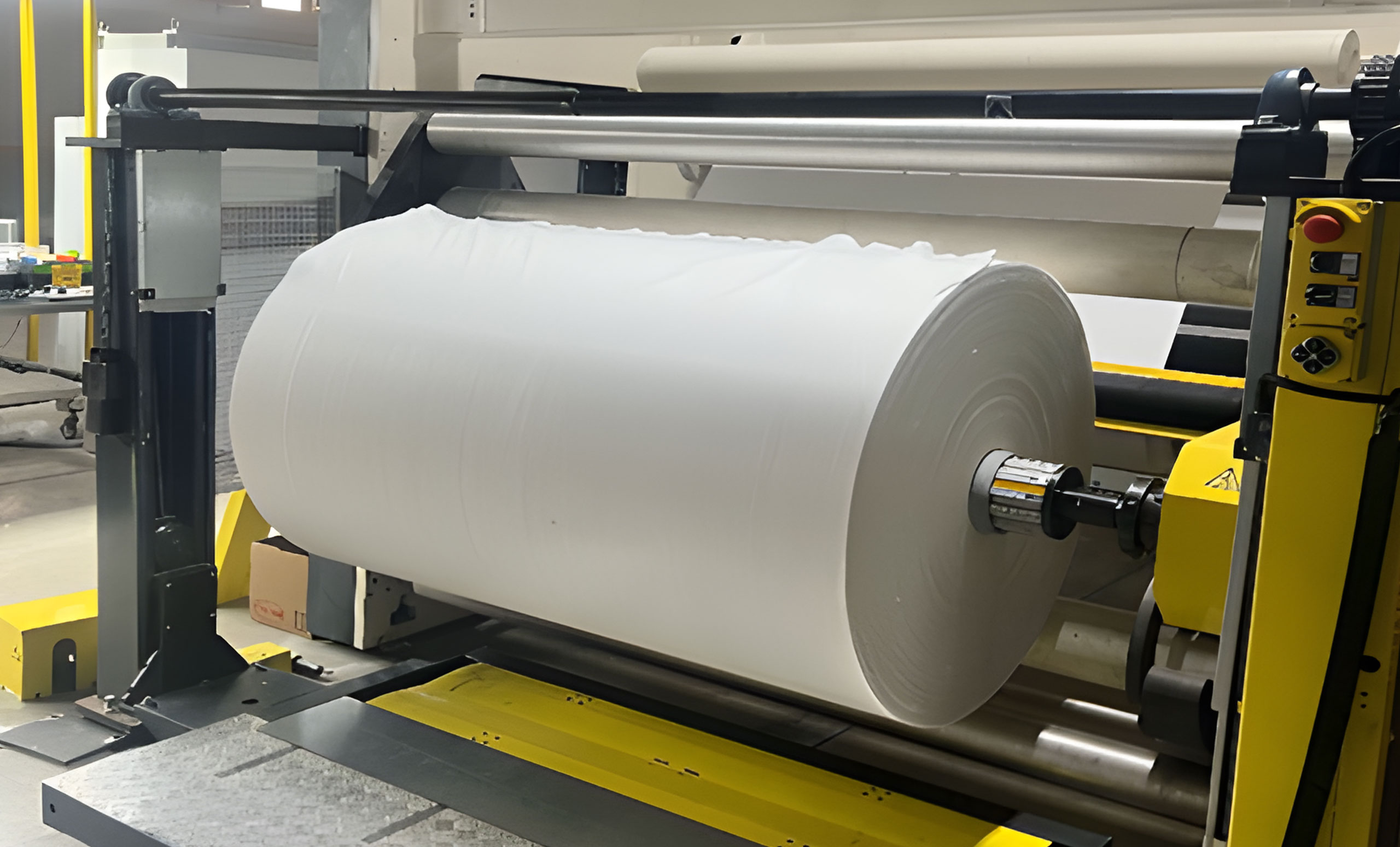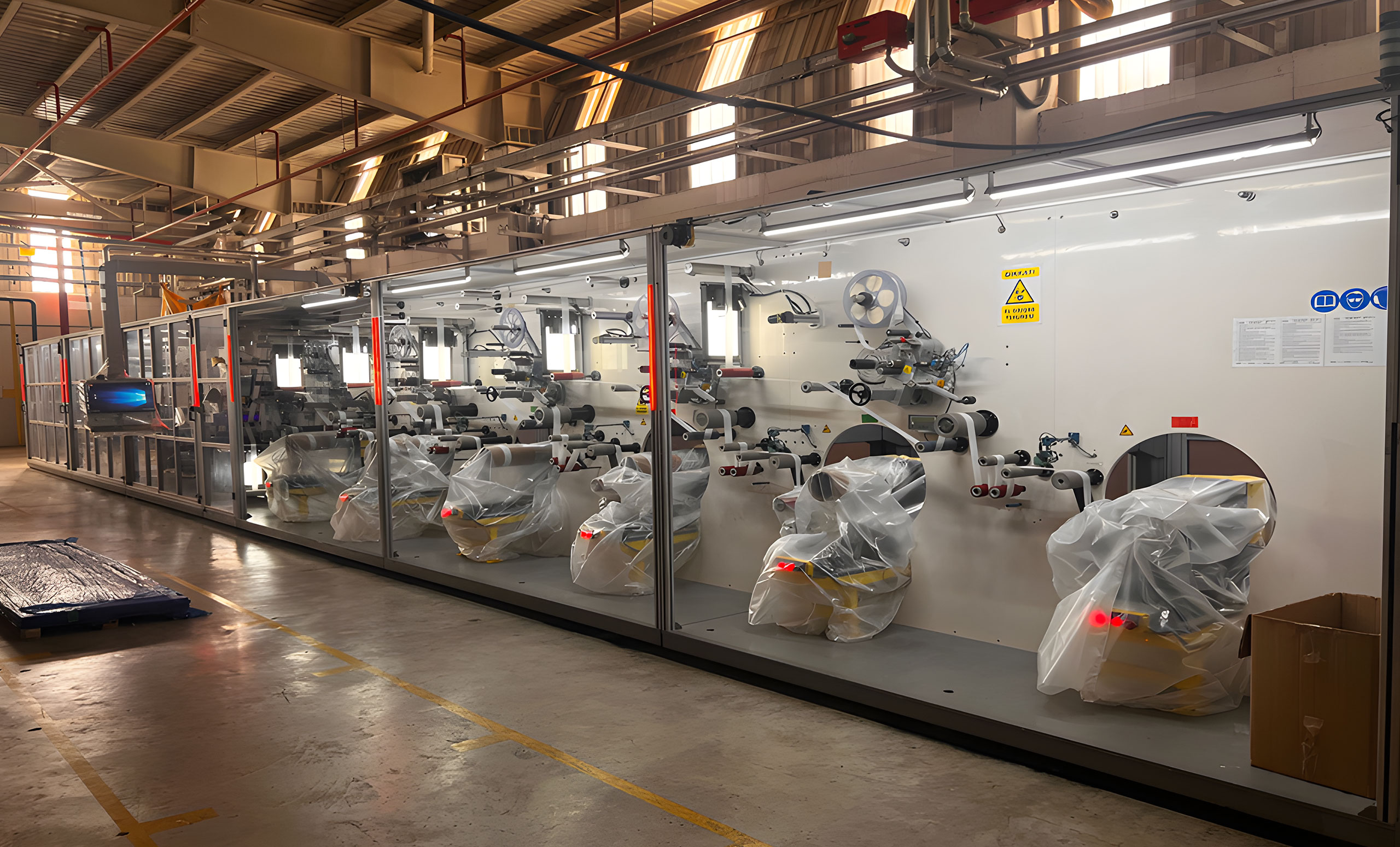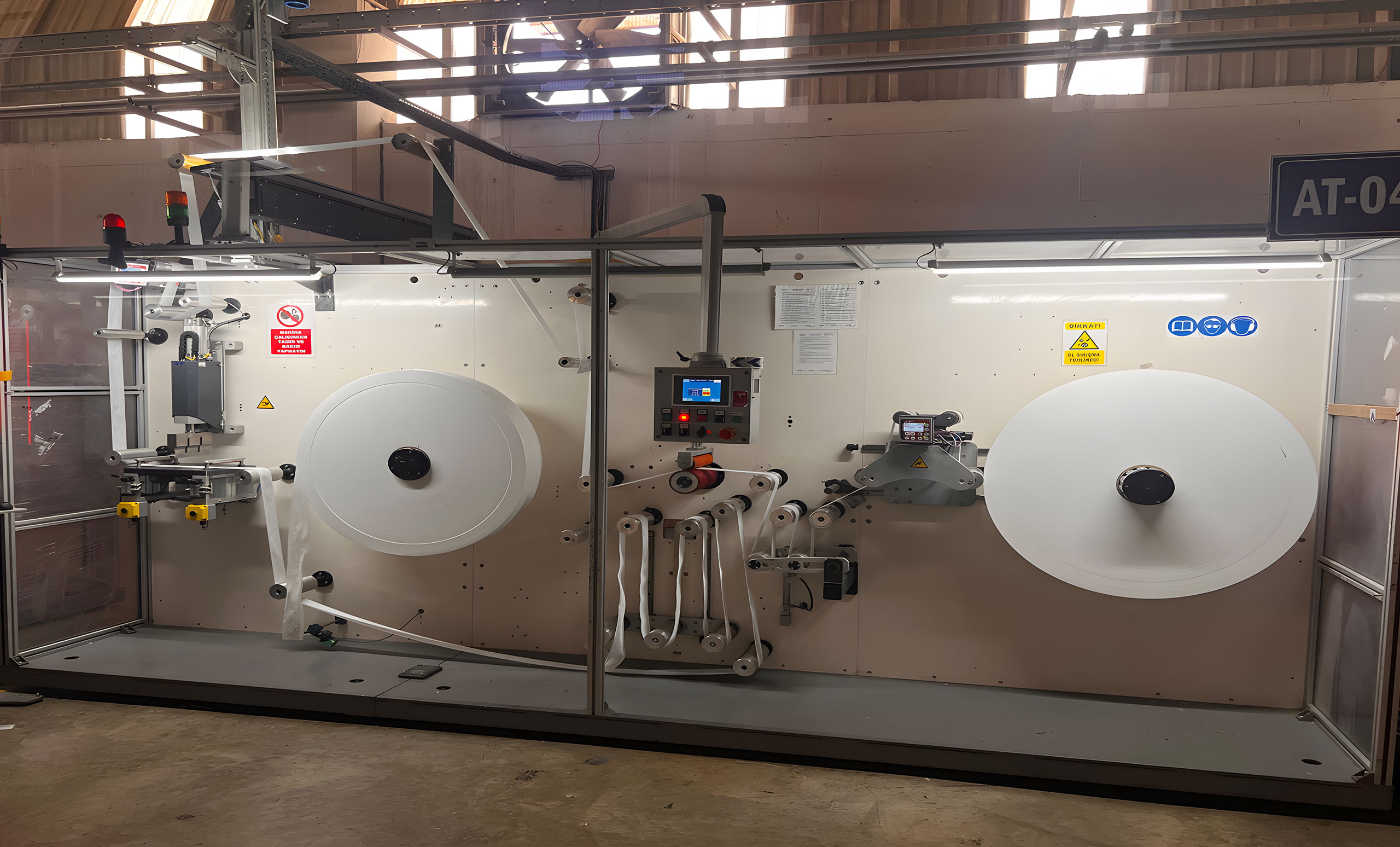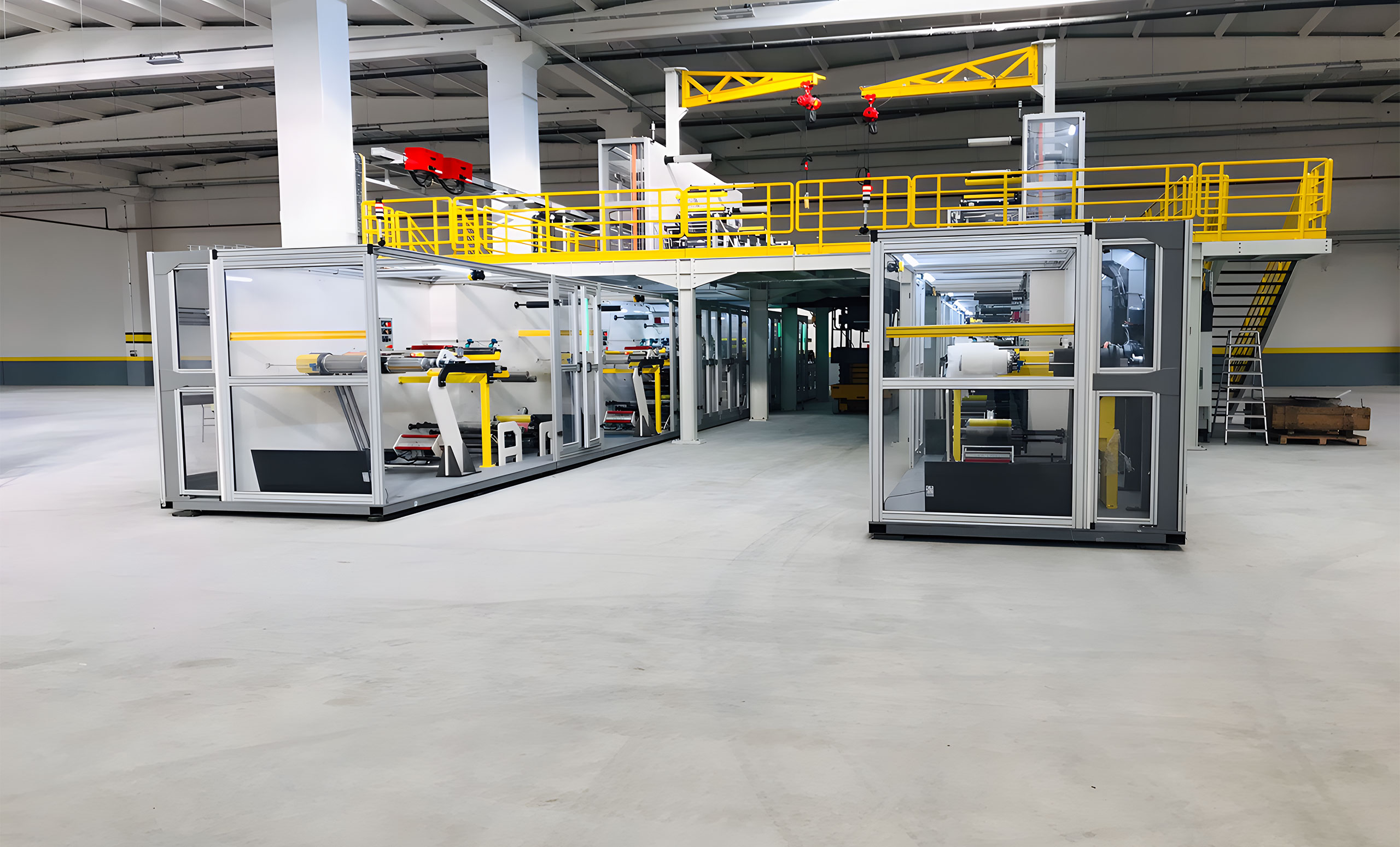The hygiene sector is a rapidly growing and constantly renewing field today. In this sector, high efficiency and quality are of great importance, especially in the production of products such as diapers, sanitary pads and adult diapers. In order to meet the increasing demand, production lines must operate efficiently, costs must be optimized and error-free production processes must be ensured. At this point, innovative machines and technological developments transform production lines and create a competitive advantage in the hygiene sector.
Innovative machines offer various solutions to increase production efficiency. Automation technologies accelerate production processes, minimize human errors and guarantee production continuity. Sensors and robotic solutions integrated into automation systems provide uninterrupted operation in production lines and increase production speed. At the same time, production line management becomes easier with advanced software solutions, so production data can be monitored in real time and potential problems can be intervened immediately. This minimizes productivity losses in the production line and allows production to be carried out in a more planned manner.
One of the most important features of the machines used in the hygiene sector is their flexibility and customizability. Each product group requires different production stages and processes. For example, machines used in diaper production must be designed to meet different production requirements such as side tape, flexible ear, reverse winding and winding correction. Innovative machines offer specific solutions for each product line by optimizing each of these processes. This allows production lines to easily adapt to different product groups and not compromise on efficiency.
In addition, energy-efficient machines offer a great advantage in terms of reducing production costs. Machines with advanced energy management systems optimize energy consumption, supporting both environmental and financial sustainability in the long term. In this way, companies producing hygiene products can contribute to environmentally friendly production processes while working with lower energy costs.
As a result, innovative machines in the hygiene sector play a critical role in increasing production efficiency, reducing costs and improving quality. Elements such as automation, flexibility, customizability and energy efficiency strengthen competition in the sector and help companies maintain their market leadership positions. Therefore, investing in new generation production machines is a strategic step that increases profitability in the long term for hygiene sector companies.
The Role of Automation Technologies in the Hygiene Sector
Automation technologies are one of the most important elements that increase efficiency in the production of hygiene products. Automation minimizes human intervention in production processes, prevents production errors and increases the quality of products. In addition, automated production lines operate faster, allowing production capacity to increase significantly. Automation systems, which are frequently used in the production of products such as sanitary pads, diapers and baby diapers, ensure that the machines and components in the production line work in synchrony with each other.
Another great advantage provided by automation is production continuity. Interruptions or human errors encountered in production based on human power are minimized thanks to automation systems. Especially in 24-hour production cycles, automatic machines provide uninterrupted operation and maximize production efficiency. In addition, these systems allow production processes to be optimized with real-time data monitoring and analysis features. Detection and rapid correction of faulty products ensures that the production line operates more efficiently and waste rates are reduced.
Automation technologies also play an important role in the hygiene sector in terms of reducing costs. It reduces labor costs and makes production processes more economical. In addition, the decrease in error rates and the increase in production speed allow businesses to produce more products in a shorter time. This proves that automation technologies are an indispensable production tool in the hygiene sector.
The Importance of Performance-Enhancing Components
Performance-enhancing components play a major role in optimizing production efficiency in the hygiene sector. These components increase the speed, accuracy and durability of the machines, ensuring that the production process progresses smoothly. For example, in machines used in the production of diapers or sanitary pads, performance-enhancing components allow production lines to operate smoothly. These components, used during the production of components such as sidebands and flexible ears, ensure that each part is produced accurately and quickly, minimizing the error rate.
Another important advantage offered by performance-enhancing components is that they increase the speed of the production line. Faster-operating machines increase production capacity and also contribute to reducing costs. This provides a great advantage, especially in hygiene products where high production volumes are demanded. High-performance machines and components make the production process more reliable by minimizing possible malfunctions on the line.
In addition, these components increase energy efficiency in the production process. Energy-saving machines both support environmental sustainability and reduce production costs. Especially in the long term, energy savings provide cost advantages to manufacturers, while performance-enhancing components increase overall efficiency and enable more effective production. This is a critical factor for the hygiene sector.
Fast Adaptation to Different Product Groups with Flexible Production Machines
The hygiene sector requires flexible production machines due to the need to produce for different product groups. Products such as diapers, adult diapers, and sanitary pads require different processes and components in the production line. This is where flexible production machines come into play. These machines can quickly adapt to different product types, allowing manufacturers to produce more than one product on the same machine park. Flexibility enables more efficient use of production lines and saves time and costs for manufacturers.
Another important advantage of flexible machines is their ability to respond quickly to changing demands in the market. When new products need to be launched or existing products need to be developed in the hygiene sector, these machines quickly adjust and adapt to new demands. This offers manufacturers the opportunity to get ahead of their competitors and take their place in the market faster. At the same time, flexible machines eliminate the need to invest in different production lines, which helps keep costs under control.
Flexibility also increases efficiency in the production process. By providing uninterrupted transitions in the production line, it minimizes stoppages and ensures that each production line operates at maximum capacity. This is a great advantage for hygiene sector manufacturers, because different product groups can be produced without losing time and customer demands can be responded to quickly. As a result, flexible production machines are one of the most effective ways to create a competitive advantage in the hygiene sector.
Innovative Machine Solutions Providing Energy Efficiency
Energy efficiency has become a critical factor in today’s industry to both reduce costs and support environmental sustainability. The hygiene sector is also taking important steps in this regard. Innovative machine solutions optimize energy consumption in production processes, reducing both production costs and minimizing environmental impacts. Especially in large-scale production facilities, energy efficient machines provide significant savings in the long term.
Energy efficient machines are generally equipped with systems that offer high performance with low energy consumption. These machines, which work integrated with automation technologies, reduce unnecessary energy expenditures and ensure that every component in the production line operates at full efficiency. In addition, energy use can be continuously monitored and optimized thanks to energy management systems. This allows businesses to control energy consumption during production and intervene when necessary.
Energy efficiency also offers businesses the opportunity to fulfill their environmental responsibilities. Machines that reduce their carbon footprint both create a sustainable production model and contribute to brands gaining an environmentally friendly image. This is also an important factor for consumers today, because environmentally sensitive manufacturers are preferred more by customers. Innovative machine solutions that provide energy efficiency offer significant advantages for the hygiene sector, both economically and environmentally.



